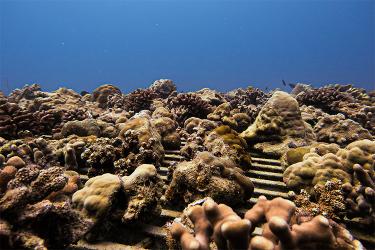NOAA Fisheries is the lead federal agency charged with stewardship of marine life. Building, operating, and decommissioning offshore wind power facilities affects a number of our key mission areas, including: fisheries, protected animals (such as sea turtles and whales), seabirds, and marine and estuarine habitats. We provide information to help the Bureau of Ocean Energy Management make informed decisions about how offshore wind energy development and operations may specifically affect endangered or threatened species, marine mammals, fisheries, marine and estuarine habitats, and fishing communities.
Assessing Effects on Endangered Species Act Listed Species and Critical Habitat
The documents and links below are resources to assist in the evaluation of impacts from offshore wind development projects on Endangered Species Act (ESA)-listed species and designated critical habitat. The Information Needs document provides an outline of the information necessary to support a robust analysis of the effects of a proposed offshore wind project on ESA-listed species and designated critical habitat. The ESA Section 7 Mapper provides a tool to explore and generate a list of ESA-listed species and critical habitat in a project action area. Links for additional resources for the Greater Atlantic and Southeast Regions are below, including general guidance on ESA section 7 consultations, issued biological opinions, and Marine Mammal Protection Act (MMPA) Incidental Take Authorizations for energy activities.
- Information Needs for Assessing Effects of Offshore Wind Activities on ESA-listed Species (last updated January 2023)
- General Guidance on ESA Section 7 Consultations (Greater Atlantic Region, Southeast Region)
- Greater Atlantic Region Biological Opinions
- Southeast Region Biological Opinions
- MMPA Incidental Take Authorizations
Essential Fish Habitat Assessment and Consultation
The documents and links below are resources to assist with the development of an Essential Fish Habitat (EFH) assessment for offshore wind development projects. The Information Needs document provides an outline of the information and analysis needed to support a robust assessment of the potential effects of a proposed offshore wind project on EFH in the region. Recommendations for Mapping Fish Habitat provides methodologies for the collection and analysis of baseline habitat data and information to support the EFH assessment. The EFH Mapper provides a tool to explore and generate a list of designated EFH and Habitat Areas of Particular Concern within the project areas. Links for additional EFH Consultation information and resources for the Greater Atlantic and Southeast Regions are below.
- Information Needs for EFH Assessments
- Recommendations for Mapping Fish Habitat
- EFH Mapper Tool
- General Guidance on EFH Consultations (Greater Atlantic Region, Southeast Region)
- NMFS-BOEM EFH Assessment Template for Offshore Wind Energy Projects
Fisheries Socioeconomic Impacts Information Needs
The documents and links below are resources to assess fisheries socioeconomic impacts from offshore wind development projects. The Information Needs document provides an outline of the information and analysis necessary to support a robust analysis of the effects of a proposed offshore wind project on commercial and recreational fisheries. Summary reports provide data on historic fishing activity (landings, revenue, effort) within each offshore wind lease or project area.
- Information Needs for Assessing Fisheries Socioeconomic Impacts
- Summary Reports of Previous Fishing Activity
Considerations for Fisheries and Wildlife Survey and Monitoring Activities to Support Offshore Wind Development
The documents below provide necessary information to consider in the development of fisheries and wildlife surveys and monitoring plans that may be conducted to support offshore wind energy development. The Engagement with Northeast Fisheries Science Center (NEFSC) document describes considerations for survey and monitoring design and coordinating with the NEFSC about technical assistance. The Responsible Offshore Science Alliance (ROSA) Offshore Wind Project Monitoring Framework and Guidelines provides fundamental elements to include in offshore wind fisheries project monitoring plans and associated studies.
The Permitting Considerations document provides information to offshore wind energy lessees/project proponents and other stakeholders about applicable permitting considerations for surveys, monitoring, or research activities targeting fish species.
The Protected Species Best Management Practices and Risk Reduction Measures document provides information and recommendations to offshore wind energy lessees/project proponents and other stakeholders for consideration when designing and implementing surveys, monitoring, or research activities targeting fish species.
- Engagement with NEFSC
- ROSA Offshore Wind Project Monitoring Framework and Guidelines
- Permitting Considerations for Fisheries Surveys and Monitoring Activities to Support Offshore Wind Energy Development
- Technical Assistance on Protected Species Best Management Practices and Risk Reduction Measures for Fisheries Surveys and Monitoring Activities to Support Offshore Wind Energy Projects Development


